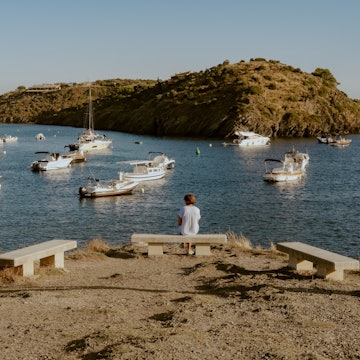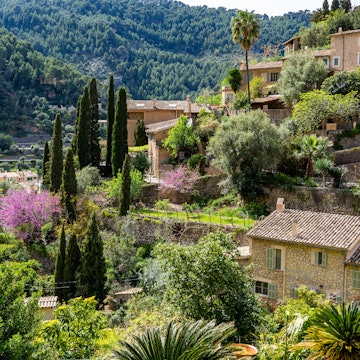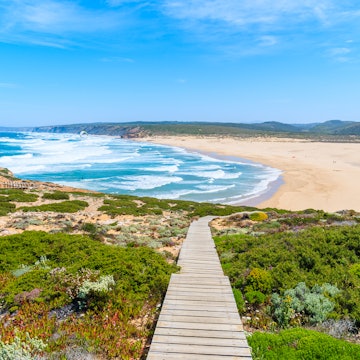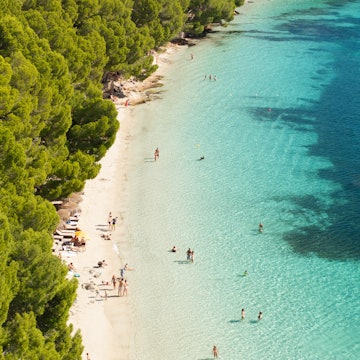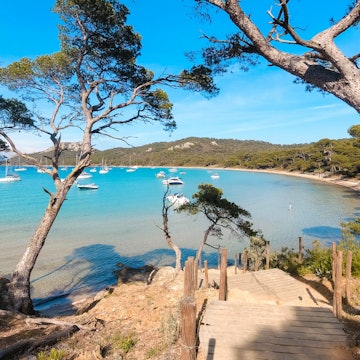

Deià occupies a stunning mountain-top location overlooking the Mediterranean. vulcano / Shutterstock
Mallorca is a legendary party location, and the yachting and beach bashes are certainly fun – but those aspects alone make it difficult to distinguish it from any other paradise island. The huge popularity of TV series Love Island has shown a glamorous side to the destination, but the clichéd stereotypes of sun, sea and sculpted bodies remain. By dispensing with the stereotypes, and venturing off the beaten track to discover the island away from the crowds, visitors can start to explore what makes Mallorca unique.
A beautiful hike in Deià
Nowhere feels more away from it all than the luxurious estate of Belmond La Residencia in the village of Deià in the Serra de Tramuntana mountains. Once a week, a hike across the estate takes place with the hotel's five resident donkeys (or, if the heat is too intense, a 'meet and greet' session, where guests can help groom the animals). Strolling through hilltop territory on a Unesco World Heritage site, the beautiful village is visible from a new angle at every turn. The gardens are a whirlwind of crimson-coloured roses interspersed with neon fuchsia and electric purple blossoms. A little further along, past the Poet's Walk commemorating creatives who once made the paradise village their home, a section of the hotel's 14 hectares of mountain olive groves appear. Known as the region's 'liquid gold', the oil produced here financially empowers Deià's residents – and those interested in sustainable tourism can adopt their own olive tree.
After a traditional picnic lunch in a stone shepherd's hut, follow the donkeys' footsteps back to the hotel, while the panoramas continue uninterrupted. The houses set against the skyline are surreally beautiful, as if part of a watercolour painting, with windows framed by exotic palm tree fronds.
Hikes only take place once per week to avoid over-tiring the donkeys; the rest of their week entails little more than grazing on the hotel's beautiful grounds.
Life in a finca
Besides the Belmond, fincas (country estates with hotels on-site) suitable for a variety of budgets are dotted around fertile parts of the island, farming precious olives, lemons and oranges. Further up the northwest coast, the stunning hilltop retreat of Jumeirah Port Soller also offers guests bottles of the island's signature orange liqueur and tours to the orange groves.
Perhaps the best finca for overnight stays is Ca's Xorc. At the summit of a bumpy mile-long rural track, a handful of friendly sheep from neighbouring fields might trot over to welcome you. Nature is constantly audible here: the chirping of cicadas floats above the chiming of cattle-bells. There are artistic touches too, from the lion sculpture beside the pool to the white horse figurine and bird cage set within a miniature lake. And Burguera – the only dairy farm on the island – offers the quirky opportunity to make your own cheese.
On the other hand, if it's just dramatic views you're seeking without the company of farmyard friends, the road up to Sa Calobra – filled with suspenseful hairpin twists and bends – is bound to satisfy. Bear in mind this gorgeous cove is popular in summer though.
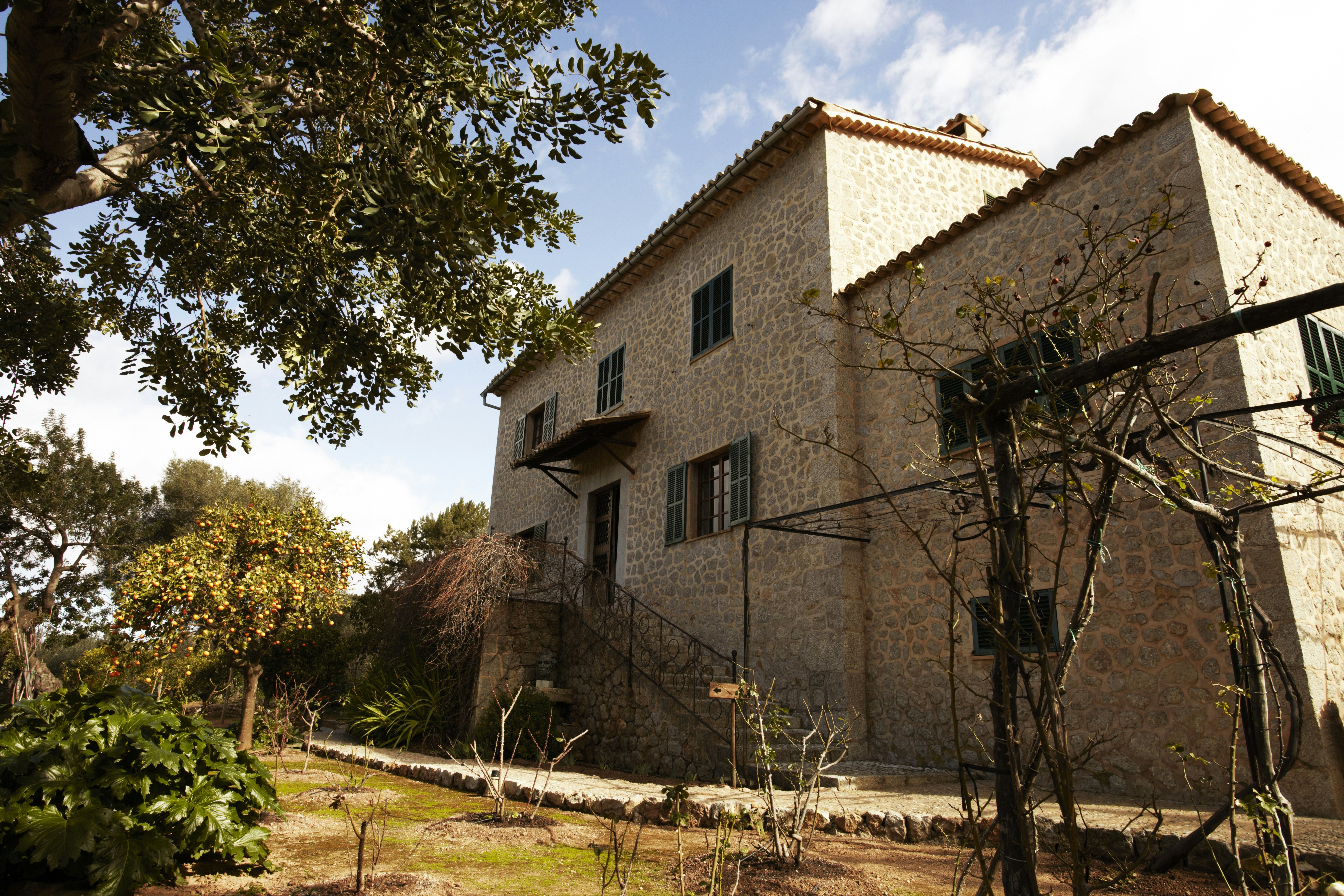
Discovering a literary legacy
While Deià – and the Belmond hotel at its centre – are the holy grail when it comes to idyllic views, the village boasts a rich literary history. Erotic novelist Anaïs Nin wrote a story based here – no doubt the literary equivalent of a Love Island tryst, albeit considerably more poetic. Hers involved a lesbian affair between two women skinny-dipping in the sea after dark.
Meanwhile the house of poet Robert Graves is also open to tourists – he'd spent decades in Deià recuperating from war trauma incurred as a soldier during the Battle of the Somme.
Other literary links can be found at the sleepy and almost equally scenic village of Valldemossa, home to the Carthusian monastery where composer Frédéric Chopin stayed with his lover, novelist George Sand. There's also a museum dedicated to the pair which still contains Chopin's piano.

Thrilling cave capers
The musically inclined might also enjoy the Coves del Drac, local caves where staff stage short classical music concerts, followed by a dimly lit boat trip through an Europe's largest underground lake past a rock formation that resembles a giant hand giving the middle finger. The sensory experience is thrilling, but dampened by the volume of the crowds, so you might do better to visit the lesser-known Coves d’Artà instead. This wonderland of stalactites was the hiding place for 2000 Arabs during the Christian conquest, and helped inspire early visitor Jules Verne's 1864 novel Journey to the Centre of the Earth. A sound-and-light show brings to life visions of heaven, hell and purgatory.
Away from it all in Artà
The small town of Artà itself is unmissable too. Remote and off the main tourist trail, it is best known for its 14th-century walled fortress, Santuari de Sant Salvador, where locals would climb to escape pirate attacks. The dramatic sweeping views rival those of most picturesque European cities, but without the crowds. Even in mid-summer, it's possible to find yourself totally alone while looking out over the hillside.
The village area below has its fair share of quirky and bizarre shops, such as Blanc du Nil at Carrer de la Ciutat 19, where you can buy seemingly any item of clothing – as long as it's white.
Those with deep pockets can stay at the Carossa Hotel, with its finca-like landscapes; otherwise try the art-focused Palacio Sant Salvador hotel with its Gaudí-designed restaurant, or one of the former monasteries nearby.
Like this? Try these
You can live like an A-Lister in Michael Douglas's Mallorca estate for a cool $32.38m
Take a look at an errant flamingo disrupting airport traffic in Mallorca
Get more travel inspiration, tips and exclusive offers sent straight to your inbox with our weekly newsletter. Make sure you're ready for anything with travel insurance from our trusted partners.
Take your Mallorca trip with Lonely Planet Journeys
Time to book that trip to Mallorca
Lonely Planet Journeys takes you there with fully customizable trips to top destinations – all crafted by our local experts.
















